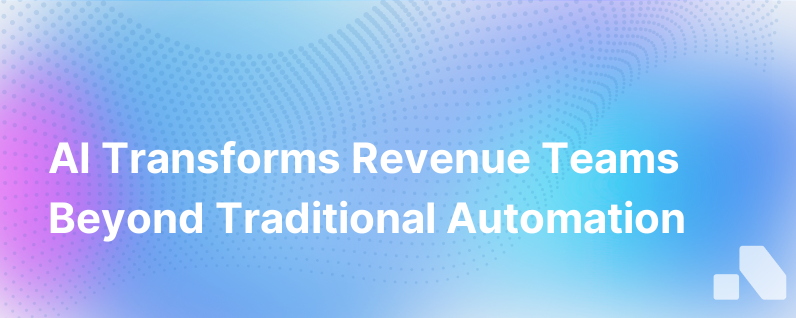
When automation first began to infiltrate the business landscape, it revolutionized the way teams operated. Tasks that once consumed hours became a matter of a few clicks. But as the marketplaces became more dynamic and the demand for personalization grew, automation alone started showing its limitations. That's where artificial intelligence (AI) entered the scene, replacing traditional automation for winning revenue teams. This shift isn’t just a trend—it’s an evolution driven by the need for deeper insights, predictive analytics, and adaptive engagement.
The Evolution From Traditional Automation to AI
Traditional automation operates on the "if this, then that" principle. It's excellent for repetitive tasks like sending follow-up emails or updating records. However, it lacks the ability to understand context, learn from previous experiences, or predict future outcomes—all of which are becoming essential in the fast-paced sales environment.
Artificial intelligence goes beyond this. AI systems are equipped with machine learning algorithms that allow them to analyze large datasets, identify patterns, and predict future trends. These capabilities are transforming revenue teams in several key ways:
Predictive Analytics
Predictive analytics leverages data, statistical algorithms, and machine learning techniques to identify the likelihood of future outcomes based on historical data. Revenue teams armed with predictive analytics can forecast sales trends, identify high-value leads, and predict customer behaviors, enabling them to allocate their resources more effectively.
Enhanced Personalization
In today’s market, personalization is vital. AI helps teams to personalize interactions at scale by analyzing individual user data and tailoring communications, offers, and content to their preferences and behaviors. This level of personalization is impossible with basic automation and is becoming a decisive factor for winning in competitive markets.
Dynamic Engagement
AI-driven systems are capable of dynamic engagement, meaning they can adjust their operations based on interactions with customers. They can send a different follow-up message based on the customer's response or no response, engage prospects across various channels, and optimize the timing of communications, leading to more successful engagement strategies.
Efficiency in Complex Scenarios
Traditional automation struggles with complexity. AI thrives on it. Whether it’s segmenting customers, generating insights from unstructured data, or identifying opportunities for upselling and cross-selling, AI can handle complex scenarios with ease, empowering revenue teams to make smarter, faster decisions.
Real-Time Decision-Making
For revenue teams, timing is everything. AI enables real-time decision-making by quickly processing and analyzing data as events happen. This allows teams to react instantly to new information, such as a change in a customer's purchase behavior or a shift in market dynamics.
Continuous Learning and Improvement
Perhaps the most significant advantage of AI over traditional automation is continuous learning. AI systems improve over time without explicit programming, refining their algorithms based on new data and interactions. This means they get better at predicting outcomes, personalizing engagements, and making decisions—the ultimate tool in a revenue team's arsenal.
AI's Transformative Impact
Aomni, for instance, is a platform that demonstrates the transformative impact of AI. It delivers tools that aid in selling more strategically by providing real-time account research, competitive insights, and personalized sales content. What used to take hours of manual effort can now be accomplished in minutes with zero effort, thanks to AI's power.
Consider a scenario where a sales representative can access a pre-curated, AI-generated battlecard customized for a prospect just minutes before a crucial sales call. Or a customer success manager who receives alerts on potential upsell opportunities based on AI's analysis of customer usage patterns. These are the realities AI is enabling for agile, forward-thinking revenue teams.
AI vs. Automation: A Complementary Relationship
While the narrative might suggest AI is completely replacing automation, a more nuanced perspective reveals they complement each other. AI elevates and extends the capabilities of automation. Basic automation paves the ground by handling mundane tasks, and AI builds upon it by adding intelligence and adaptability.
The combination of both allows revenue teams to not just do things better but to do better things—moving beyond efficiency to effectiveness. With AI, revenue teams aren't just automating tasks; they are creating new opportunities for growth and customer engagement, leading to innovation in sales strategies and customer experiences.
The Human Element in the AI Era
It's important to acknowledge that AI doesn't make human insight obsolete; rather, it enhances human capabilities. AI provides the data and recommendations, but humans provide the context and make the strategic decisions. Winning revenue teams will use AI as a tool to amplify their creativity, emotional intelligence, and strategic thinking.
In conclusion, the replacement of traditional automation with AI for revenue teams marks a significant leap towards a more strategic, personalized, and proactive business approach. As AI continues to evolve, it will undoubtedly unlock even more possibilities for growth and innovation across all sectors.
For those teams ready to embrace AI, the future isn’t just automated—it's intelligent, adaptive, and limitless.
Incorporating AI into your revenue strategy is no longer an option—it's a necessity to stay competitive and relevant. Transitioning from basic automation to intelligent tools like Aomni can position your team to not just win more deals, but to win them smarter and with greater insight than ever before.